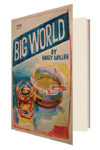A debut short-story collection, Big World is the second book in the Short Flight/Long Drive series from Hobart literary magazine. At six by four inches, it fits comfortably in your purse or pocket. The covers were illustrated by David Kramer and feature a whiskey tumbler and ashtray on the front and a road map of eastern Tennessee with a detail of a cheap motel on the back. The design calls to mind the old Dell mysteries with the crime map on the reverse cover that were more or less the same dimensions. Though the book is physically small, these stories deliver in a big way.
In Big World we meet all manner of women on the cusp of disasters of their own making: barfly sisters, a vacationing couple in a doomed relationship, a daughter who sleeps with one of the partners at her father’s firm. Women with bad luck and worse judgment. Women who go to bars broke and get as drunk as they please until they are “in no condition to do much of anything but fuck,” a receptionist announces in the story “Temp.”
Temporary is an apt word, for Miller’s characters tend to be introverted women whose appetite for alcohol and/or desire for sex make them extroverted, but only for a little while. They get involved with men who aren’t available, emotionally or otherwise, and are invariably treated like kitchen appliances: “convenient, yet out of the way.”
Though narrow in scope, Big World gives a full anatomy lesson of the kind of heart that’s kick-started by booze, cigarettes, and jukebox songs of regret. Miller writes with savage charm. The pronouncements are harsh, the judgments severe, and while the wisecracks arm these women with a kind of deadpan humor, it would be a mistake to call them precocious. “Gambling required a delicate balance of desperation and delusion, and I wasn’t feeling much like deluding myself.” As is often the case with those who use their wit to deflect attention, what these characters leave out is often more revealing than what they say.
But the women of Big World are neither pitiable nor pathetic. “Not All Who Wander Are Lost” is about a waitress who spurns the attention of an older man while restlessly pursuing her manager. “Some people don’t like pleasure,” he tells her after they have sex. It’s an accusation she’s heard before. “The boyfriend who moved out West to find himself said something similar. He said I was a machine, that if he ripped me open I’d look like the inside of a wall.” How did she get like this? What makes Miller’s women so empty, so cynical?
The first story, “Leak,” provides a clue. A young girl whose mother has passed away lives alone with her father. He can’t cook, she doesn’t have many friends, and they take the same depressing vacation year after year. The only thing that changes is her body, which causes her father to become even more distant and remote. A water stain on the ceiling above her bed arrives simultaneously with her new breasts. Together they auger a collapse both imminent and dangerous. “It was like looking through a porthole,” she reflects. It’s not clear if she’s talking about a hole in her father’s shirt, the stain on the ceiling, or—if the stories that follow are any indication—her future.





